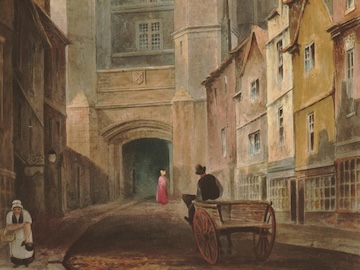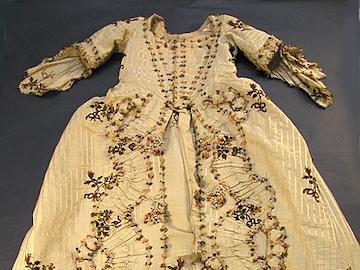Sheep sheltering beneath the trees in Eldred’s orchard, Blagdon, North Somerset. A man who stole one of these sheep would be liable to death at the end of a rope. A man who cut one of these trees down would join him on the gallows. A man who picked one of these apples would commit only a misdemeanour, but if he found a basket of read-picked apples and took that, he too would be making an appointment with the hangman. If instead of these intolerable crimes he attacked his father with a hatchet and did not manage to kill him, the hangman would not be called upon to do his office.
Yet even this number of executions was ghastly. Every six weeks there was a procession of criminals through the streets of London for the long distance between Newgate and Tyburn, and noisy and ribald crowds flocked to see the last grim spectacle as an amusement. Sometimes the executions were horrible. The drop was not invented until late in the century, and the friends of the man who was hanging by the neck sometimes clung to his feet in order to hasten strangling.*
Until 1790 the law required that the execution of female criminals should be by burning.* By selling convicts for a limited period, and sometimes for life, to work on the plantations in America, a punishment hardly less terrible than death was inflicted. The price was about £20 for each convict, and the slavery was as real as that of the negro. After the American Revolution [1776-83] criminals were transported to Australia.
Travellers entering London by the Edgeware Eoad passed rows of rotting corpses hung on gibbets, and often arrayed in full dress and wig. Grinning skulls of executed offenders lined the top of Temple Bar. In other ways crime was made to seem odious. Men and women were flogged through the London streets, or fastened helpless in the public pillory, to be pelted sometimes to death by cruel and mischievous idlers.
Abridged.
From ‘History of the British Nation’ (1903). ‘England in the Eighteenth Century’ Volume VII (edition of 1892). Additional information from the Account of the Ordinary of Newgate for May 9th, 1726, reproduced at ‘The Proceedings of the Old Bailey’.
* The death penalty for murder was suspended in 1965 and abolished in 1969. In theory at any rate, death remained the penalty for treason until 1998. The public campaign to end the death penalty was led by the rich, determined but decidedly eccentric Violet van der Elst.
* The Treason Act 1790 (30 Geo. 3. c. 48) abolished drawing and burning at the stake as the penalty for women convicted of high treason, petty treason and abetting, procuring or counselling petty treason. The sentence was changed to drawing and hanging; the last woman to be burnt was murderer Catherine Hayes, on May 9th, 1726. In 1828, petty treason (causing the death of a social superior) was redefined as simple murder, but the death penalty remained. For some years, the custom has been to strangle the victim before lighting the pyre, but the executioner bungled Catherine’s case. She was spared the flames when a bystander flung a plank of wood and crushed her skull, killing her instantly.
Questions for Critics
1. What is the author aiming to achieve in writing this?
2. Note any words, devices or turns of phrase that strike you. How do they help the author communicate his ideas more effectively?
3. What impression does this passage make on you? How might you put that impression into words?
Based on The English Critic (1939) by NL Clay, drawing on The New Criticism: A Lecture Delivered at Columbia University, March 9, 1910, by J. E. Spingarn, Professor of Comparative Literature in Columbia University, USA.
Précis
The business of execution was horrible, an agonising public humiliation followed by a lingering death, and the remains of the criminal were left for public display. Those who were spared the rope might be sold for twenty pounds into slavery in the American colonies, or flogged at the cart or pilloried, where a bloodthirsty public sometimes tortured them to death. (60 / 60 words)
The business of execution was horrible, an agonising public humiliation followed by a lingering death, and the remains of the criminal were left for public display. Those who were spared the rope might be sold for twenty pounds into slavery in the American colonies, or flogged at the cart or pilloried, where a bloodthirsty public sometimes tortured them to death.
Variations: 1.increase the length of this precis to exactly 65 words. 2.reduce the length of this precis to exactly 55 words. 3.introduce one of the following words into the precis: about, because, if, just, must, unless, until, whereas.
Archive
Word Games
Sevens Based on this passage
Suggest answers to this question. See if you can limit one answer to exactly seven words.
Variations: 1.expand your answer to exactly fourteen words. 2.expand your answer further, to exactly twenty-one words. 3.include one of the following words in your answer: if, but, despite, because, (al)though, unless.
Jigsaws Based on this passage
Express the ideas below in a single sentence, using different words as much as possible. Do not be satisfied with the first answer you think of; think of several, and choose the best.
Spinners Find in Think and Speak
For each group of words, compose a sentence that uses all three. You can use any form of the word: for example, cat → cats, go → went, or quick → quickly, though neigh → neighbour is stretching it a bit.
This exercise uses words found in the accompanying passage.
1 Garden. Ghastly. Pelt.
2 Hasten. Skull. Theft.
3 Mischievous. Rather. Sell.
Variations: 1. include direct and indirect speech 2. include one or more of these words: although, because, despite, either/or, if, unless, until, when, whether, which, who 3. use negatives (not, isn’t, neither/nor, never, nobody etc.)
High Tiles Find in Think and Speak
Make words (three letters or more) from the seven letters showing below, using any letter once only. Each letter carries a score. What is the highest-scoring word you can make?
Your Words ()
Post Box : Help Available
You are welcome to share your creativity with me, or ask for help with any of the exercises on Clay Lane. Write to me at this address:
See more at Post Box.
If you like what I’m doing here on Clay Lane, from time to time you could buy me a coffee.
Buy Me a Coffee is a crowdfunding website, used by over a million people. It is designed to help content creators like me make a living from their work. ‘Buy Me a Coffee’ prides itself on its security, and there is no need to register.
Related Posts
On his visits to Durham Gaol, prison reformer John Howard found conditions that were all too familiar.
Picture: After Thomas Miles Richardson (1784-1848), via the British Museum. © The Trustees of the British Museum, shared under licence CC BY-NC-SA 4.0.. Source.
Posted January 15
The politicians of Georgian England went to surprising lengths to shield domestic businesses from overseas competition.
Picture: © Auckland Museum, Wikimedia COmmons. CC BY-SA 4.0.. Source.
Posted December 10 2024
Karl Philipp Moritz described three kinds of criminal in Georgian England, from the gentlemanly cutpurse to the deadly footpad.
Picture: By Isaac Robert Cruikshank (1789–1856), via Wikimedia Commons. Licence: Public domain.. Source.
Posted January 10 2022
Highwayman Claude Du Vall robbed a carriage on Hampstead Heath in the most courteous manner imaginable.
Picture: By William Powell Frith (1819-1909), via Wikimedia Commons. Licence: Public domain. . Source.
Posted March 22 2021






